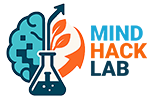Power Skills
Why Your Next Promotion Depends on Skills No Algorithm Can Touch
I spent three years watching brilliant people get passed over for promotions. Not because they couldn't code, analyze data, or manage budgets. They got stuck because they couldn't read a room, influence a decision, or bounce back when projects imploded. Meanwhile, the people moving up? They had something else entirely.
What's Really Happening Here
The problem isn't your technical skills. It's that your Connection & Communication pillar cracked at the same time the workplace shifted under everyone's feet. The World Economic Forum's Future of Jobs Report 2025 put it bluntly: resilience, empathy, active listening, and collaboration aren't "soft skills" anymore—they're the critical differentiators for the next decade.
While you were perfecting your craft, the game changed. Now it's connection and communication skills that separate the people who thrive from those who just survive.
The Four Skills That Actually Move the Needle
Emotional Intelligence: The Real Leadership Accelerator
I've watched engineers sit on game-changing ideas because they couldn't navigate one difficult conversation. Meanwhile, someone else in the meeting frames the exact same concept in a way that lands—and gets the green light.
Emotional intelligence isn't about being "nice." It's about reading the undercurrents in a Zoom call, defusing tension before it derails a project, and building trust fast enough to matter. When you can do that, you don't just get noticed. You get followed.
Communication & Influence: Where Ideas Actually Go to Live
Here's what I learned: great ideas die in silence. The most innovative solution in the world means nothing if you can't explain why it matters to someone who thinks in budget cycles, not code.
Actually, scratch that—it's not just about explaining. It's about framing your message so it clicks across departments, cultures, and hierarchies. When you can make complex strategies feel urgent and achievable, you don't just contribute. You shape outcomes.
Interpersonal Networking: Your Invisible Safety Net
The biggest opportunities I've seen come through people, not job boards. The colleague you helped during that impossible deadline who now leads another division. The client who remembers how you handled things when everything went sideways.
A strong network isn't about collecting LinkedIn connections. It's about building relationships that cushion career risks and unlock projects you never imagined. When disruption hits—and it always does—your relationships are what keep you from free-falling.
Adaptability & Resilience: The Only Job Security Left
If the last few years taught us anything, it's that "but this is how we've always done it" is career suicide. Markets flip, tools evolve, entire org charts get restructured overnight.
The employees who adapt don't just survive the chaos—they lead through it. They become the steady hand others rely on when everything's uncertain.
Why This Matters Right Now
The data backs this up. The WEF report shows employers now rate resilience, flexibility, and agility as more valuable than pure technical expertise. Think about that for a second.
We're in the middle of an AI revolution that's automating everything from code to reports. But AI can't lead humans, earn trust, or bounce back from failure. That's your lane. That's where you create value no algorithm can touch.
Human-Centric Power Skills → MHL Life Skills
Emotional Intelligence
Lead with empathy, manage conflict, build trust in hybrid teams
Mapped MHL Pillars: Emotional Mastery & Self-Forgiveness · Connection & Communication · Confidence & Calm Under Pressure
- Individual Benefits: deeper relationships, conflict management, stress resilience
- Business ROI: lower turnover, faster conflict resolution, higher productivity
Communication & Influence
Translate complex ideas into clear, compelling messages across teams & cultures
Mapped MHL Pillars: Connection & Communication · Confidence & Calm Under Pressure · Productivity & Achievement
- Individual Benefits: career visibility, persuasive influence, leadership readiness
- Business ROI: fewer misalignments, stronger brand & client outcomes, better collaboration
Interpersonal Networking
Build relationships that unlock opportunities, partnerships, and innovation
Mapped MHL Pillars: Connection & Communication · Resilience & Life Transitions · Motivation & Emotional Resilience
- Individual Benefits: new opportunities, mentorship, belonging, innovation
- Business ROI: breaks silos, external partnerships, faster problem-solving
Adaptability & Resilience
Thrive in ambiguity, pivot quickly, stay grounded during disruption
Mapped MHL Pillars: Resilience & Life Transitions · Stress Mastery & Work-Life Balance · Rest & Recovery Mastery · Focus & Self-Management
- Individual Benefits: future-proof career, confidence in change, bounce-back strength
- Business ROI: agile workforce, reduced burnout costs, culture of innovation
The 30-Minute Reality Check
If you're feeling stuck in your career—like you're doing great work but somehow invisible when it comes to advancement—your cracked pillar might be clearer than you think. Here's what real relief looks like:
One 30-minute session focusing on authentic communication techniques.
Not networking tips or presentation hacks. Actual skills for reading emotional cues, handling difficult conversations, and building influence that lasts.
Then you rebuild over 30 days. Self-awareness practices that help you understand your own patterns. Boundary-setting scripts that protect your energy while strengthening connections. Resilience techniques that turn setbacks into stepping stones.
This is skills training, not therapy.
Your Edge in the AI Era
Look, I've hired enough people to know what really matters. Technical skills get you in the room. Human-centric power skills keep you there and move you forward.
Companies don't invest in people just because they're "nice to have." They invest in employees who move the needle. Teams led with emotional intelligence retain talent and outperform. Clear communicators align projects faster. Resilient employees fuel innovation.
Translation? Master these skills, and you don't just protect your career—you make yourself indispensable.
The professionals I've watched succeed aren't just better employees. They're the ones who get called leaders.
Try one session. If it helps, keep going.
Ready to Build Your Career-Defining Skills?
Start with one 30-minute session and discover which pillar needs your attention first.
